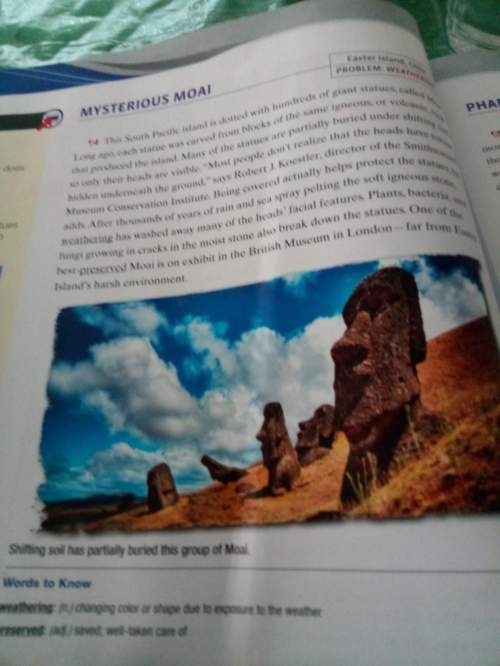

Answers: 1


Another question on English

English, 21.06.2019 20:10
Memories of a memory have you ever witnessed something amazing, shocking or surprising and found when describing the event that your story seems to change the more you tell it? have you ever experienced a time when you couldn't really describe something you saw in a way that others could understand? if so, you may understand why some experts think eyewitness testimony is unreliable as evidence in scientific inquiries and trials. new insights into human memory suggest human memories are really a mixture of many non-factual things. first, memory is vague. imagine your room at home or a classroom you see every day. most likely, you could describe the room very generally. you could name the color of the walls, the floors, the decorations. but the image you describe will never be as specific or detailed as if you were looking at the actual room. memory tends to save a blurry image of what we have seen rather than specific details. so when a witness tries to identify someone, her brain may recall that the person was tall, but not be able to say how tall when faced with several tall people. there are lots of different kinds of "tall." second, memory uses general knowledge to fill in gaps. our brains reconstruct events and scenes when we remember something. to do this, our brains use other memories and other stories when there are gaps. for example, one day at a library you go to quite frequently, you witness an argument between a library patron and one of the librarians. later, when telling a friend about the event, your brain may remember a familiar librarian behind the desk rather than the actual participant simply because it is recreating a familiar scene. in effect, your brain is combining memories to you tell the story. third, your memory changes over time. it also changes the more you retell the story. documented cases have shown eyewitnesses adding detail to testimony that could not have been known at the time of the event. research has also shown that the more a witness's account is told, the less accurate it is. you may have noticed this yourself. the next time you are retelling a story, notice what you add, or what your brain wants to add, to the account. you may also notice that you drop certain details from previous tellings of the story. with individual memories all jumbled up with each other, it is hard to believe we ever know anything to be true. did you really break your mother's favorite vase when you were three? was that really your father throwing rocks into the river with you when you were seven? the human brain may be quite remarkable indeed. when it comes to memory, however, we may want to start carrying video cameras if we want to record the true picture. part a and part b below contain one fill-in-the-blank to be used for all three question responses. your complete response must be in the format a, b, c including the letter choice, commas, and a space after the commas. part a: which of the following best explains why memories from childhood are unreliable? fill in blank 1 using a, b, or c. our brains add details and general knowledge to childhood memories. our brains are not as reliable as video cameras are. our brains create new stories to make the past more interesting. part b select one quotation from the text that supports your answer to part a. add your selection to blank 1 using e, f, or g. but the image you describe will never be as specific or detailed as if you were looking at the actual room. when a witness tries to identify someone, her brain may recall that the person was tall, but not be able to say how tall. to do this, our brains use other memories and other stories when there are gaps. select one quotation from the text that supports your answer to part a. add your selection to blank 1 using h, i, or j. documented cases have shown eyewitnesses adding detail to testimony that could not have been known at the time of the event. with individual memories all jumbled up with each other, it is hard to believe we ever know anything to be true. when it comes to memory, however, we may want to start carrying video cameras if we want to record the true picture answer for blank 1:
Answers: 2

English, 21.06.2019 23:10
How does the author create a surprise ending? cite evidence from the text to support your answer.
Answers: 1

English, 22.06.2019 08:00
Which tragic element creates pity and fear in the audience? the triumph of the antagonist the spectacle created by the playwright the downfall of the protagonist the inclusion of the chorus
Answers: 3

English, 22.06.2019 08:10
More than a hundred million e-mails are sent around the world each day, and they are all vulnerable to interception. digital technology has aided communication, but it has also given rise to the possibility of those communications being monitored. according to zimmermann, cryptographers have a duty to encourage the use of encryption and thereby protect the privacy of the individual. —the code book, simon singh what is the purpose of the statistic in this passage? it shows how big the need is for protection. it explains that email is an effective form of communication. it gives new ways to monitor email traffic. it illustrates how popular email has become.
Answers: 2
You know the right answer?
many schools have replaced face to face teaching and learning with online lessons. There have been m...
Questions


English, 23.02.2021 01:20

Mathematics, 23.02.2021 01:20



Mathematics, 23.02.2021 01:20

Chemistry, 23.02.2021 01:20



Biology, 23.02.2021 01:20


English, 23.02.2021 01:20


Business, 23.02.2021 01:20


History, 23.02.2021 01:20

Mathematics, 23.02.2021 01:20







